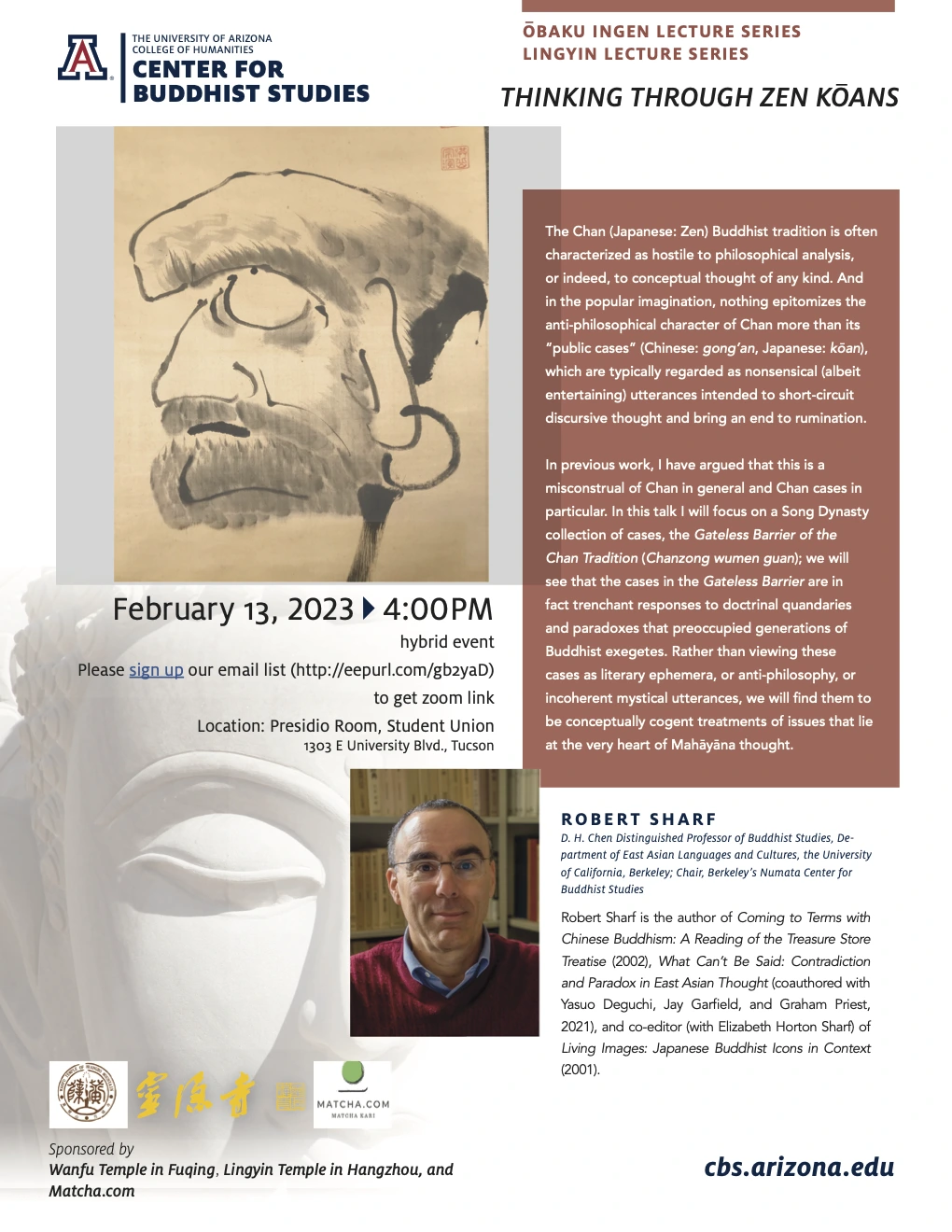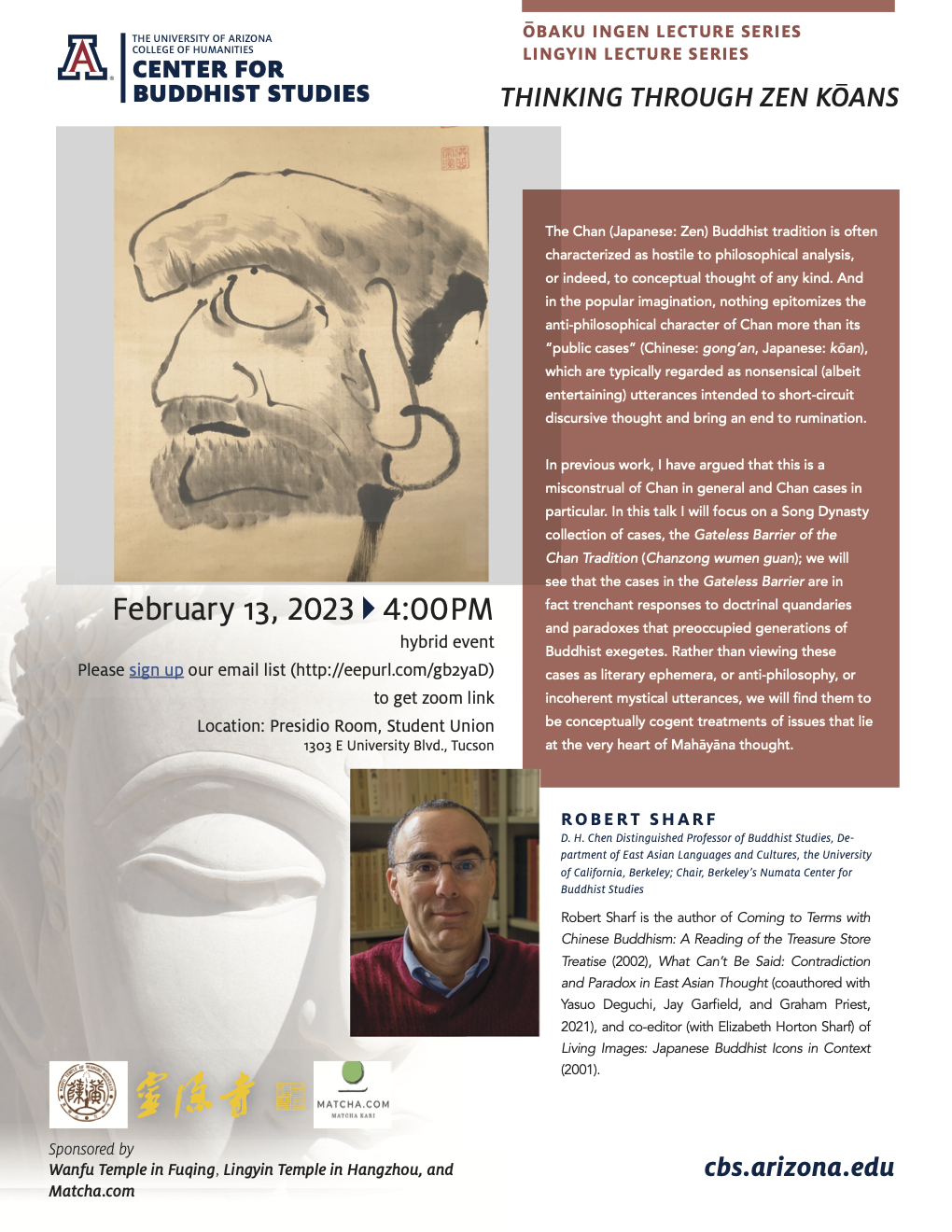
Dear Friends of the Center for Buddhist Studies,
Please join us on February 13th at 4 pm in Presidio Room, Student Union for the next lecture of Ōbaku Ingen/Lingyin Lecture Series of the term! This is a hybrid event (in-person/zoom).
To receive a link to the webinar, please sign up for our email list here: http://eepurl.com/gb2yaD. If you are already on our list and have updated your preferences by selecting "Lectures and Academic Research," you will receive the link soon.
The year 2022 marks the 350th death anniversary of Zen Master Yinyuan Longqi (隱元隆琦1592-1673, Ingen Ryūki in Japanese). Special ceremonies and events will be held in both Japan and China to honor this great Zen master. In North America, the Center for Buddhist Studies, College of Humanities at the University of Arizona is organizing a series of commemorative events which will run for one year beginning May 3, 2022. These events will present and explore the extraordinary life of Zen Master Yinyuan and the great achievements of the Huangbo 黃檗 Chan tradition (known as the Ōbaku school of Zen Buddhism in Japan) that Yinyuan pioneered in China and Japan. These events highlight the intersection between religion, art, and culture in China and Japan and will be presented in both online and offline formats. Activities will include an online exhibition of works of art related to the Ōbaku tradition, academic lectures, musical performances, and tea-related events. (Visit our Ōbaku Ingen website at: ingen.arizona.edu)
Time and Location:
Hybrid event
Time: 4:00-5:30 pm (Arizona Time)
Location: Presidio Room, Student Union
Address: 1303 E University Blvd, Tucson
Talk title: “Thinking Through Zen Kōans”
Speaker: Dr. Robert Sharf (D. H. Chen Distinguished Professor of Buddhist Studies, Department of East Asian Languages and Cultures, the University of California, Berkeley; Chair, Berkeley’s Numata Center for Buddhist Studies)
Abstract:
The Chan (Japanese: Zen) Buddhist tradition is often characterized as hostile to philosophical analysis, or indeed, to conceptual thought of any kind. And in the popular imagination, nothing epitomizes the anti-philosophical character of Chan more than its “public cases” (Chinese: gong’an, Japanese: kōan), which are typically regarded as nonsensical (albeit entertaining) utterances intended to short-circuit discursive thought and bring an end to rumination.
In previous work, I have argued that this is a misconstrual of Chan in general and Chan cases in particular. In this talk I will focus on a Song Dynasty collection of cases, the Gateless Barrier of the Chan Tradition (Chanzong wumen guan); we will see that the cases in the Gateless Barrier are in fact trenchant responses to doctrinal quandaries and paradoxes that preoccupied generations of Buddhist exegetes. Rather than viewing these cases as literary ephemera, or anti-philosophy, or incoherent mystical utterances, we will find them to be conceptually cogent treatments of issues that lie at the very heart of Mahāyāna thought.
Speaker Bio:
Dr. Robert Sharf is the author of Coming to Terms with Chinese Buddhism: A Reading of the Treasure Store Treatise(2002), What Can’t Be Said: Contradiction and Paradox in East Asian Thought (coauthored with Yasuo Deguchi, Jay Garfield, and Graham Priest, 2021), and co-editor (with Dr. Elizabeth Horton Sharf) of Living Images: Japanese Buddhist Icons in Context (2001).
These lecture series are made possible thanks to the generous support from Wanfu Temple in Fuqing, Lingyin Temple in Hangzhou, and Matcha.com.
Please follow us on social media to receive future updates:
Facebook: Center for Buddhist Studies
Instagram: @UACBS
Twitter: @UACBSofficial
Center's website: cbs.arizona.edu
We look forward to seeing you there!


